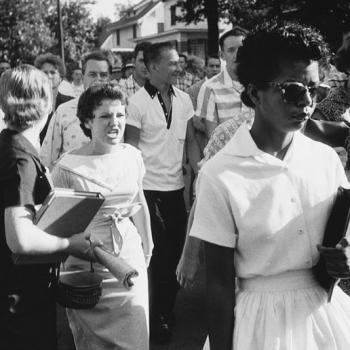
26When Jesus saw his mother and the disciple whom he loved standing beside her, he said to his mother, ‘Woman, here is your son.’ 27Then he said to the disciple, ‘Here is your mother.’ And from that hour the disciple took her into his own home. [John 19:26-27]
More than a few years ago, a man who lived alone took note of neighbors who lived in the house across the way – a husband, wife and young son. Even from that distance, and with little spoken between them, the man sensed that there was stress in the household: The couple always appeared to be arguing about one thing or another; from the looks of things, they were struggling to make ends meet. The man wondered about their young son, and whether the child might also be struggling.
One day, the couple asked the man if he might babysit their son. More than curious about the little boy, and guessing that the couple had little or no money to pay a babysitter, he said yes. He welcomed the curious little boy into his home and began engaging him in some conversation as he tried to learn what snacks and movies the child might enjoy.
That one visit together wouldn’t be the last. As time passed and the boy grew older, he sought out the friendly neighbor on his own whenever he saw the man outside. The man began gathering some books and crayons and tried to help the boy with his schoolwork. No doubt, recognizing that he was both welcome and safe at the man’s house, the boy spent more and more time there. As the boy became more comfortable, he spoke a little about his parents, and the man began to be more attentive for signs that the parents might not be able to provide the boy with a safe and stable home.
Through the boy’s formative years, he spent more and more time visiting the kind man who talked to him, read with him, fed him good food, and gave him space to share his feelings. The man observed that things seemed to deteriorate at the boy’s home. His father moved out. His mother seemed to struggle more and more – to survive her mental health challenges, to keep working, to pay bills. Her behavior became increasingly unpredictable.
The man never gave up on the young boy – continuing to feed him, provide clothing for him, and encourage him in his schoolwork.
“Could I just live here?”
Then the day came that the boy, now a young teenager, asked if he might just live at the man’s house.
The man was concerned. What if he couldn’t give the boy the stability he hoped? What if the teen didn’t want to follow his house rules?
The boy’s mother was very supportive of the idea. She trusted the man, and with one fewer mouth to feed and one fewer person for whom to care, agreed that the move was best for everyone. The man hoped her son would have both structure and a positive male role model.
And so the young teen moved across the street, into the man’s home. The teen was struggling – with school, with friends, with making good decisions. The man committed time and attention to him. Not wealthy himself by any means, the man made sure that a constantly hungry teen always had healthy food to eat, clothes to wear, support with his schoolwork, and visits with his mother as she was able.
Almost too quickly, the teen finished high school. Now a young man, he had choices before him he otherwise might not have had: He entered vocational school, enlisted with the military, married and started a family of his own.
The man who had taken him in was still the father figure and stability in the young man’s life, offering support and encouragement where he could.
And the day came that the young man learned his biological father, who had moved away and really out of his life, had died.
It isn’t too late…
For years, the man had wanted to make the relationship with the boy he’d taken in years before “official,” but he didn’t feel that he could or should adopt him because he had never wanted to give the impression that he wanted to replace his father in his life. With his father having died, the man felt a strong sense that the time was right to formalize a relationship that seemed to be of God-making for many years. He asked the now-adult young man if he might adopt him.
The young man thoughtfully responded, “I thought you’d never ask.”
An adoption made their family-of-the-heart official.
Families don’t always arise through biological ties…
Families don’t always arise through biological ties. Sometimes, families come into being through God nudges – and our scriptures reveal some of those families of the heart. A God-nudge brought together a mother-in-law and daughter-in-law when kinswomen Naomi and Ruth leaned upon each other for survival after their husbands had died. A God nudge brought together Mordecai and Esther after Esther had been orphaned, leading Esther to an unexpected life as the wife of Persian King Ahasuerus and a lifeline for her Jewish people.
In especially during Eastertide, we are reminded that a God-nudge brought together a disciple and Jesus’ own mother, giving the disciple a mother for whom to care and to care for him, and giving a grieving mother a son for whom to care and from whom to receive care.
Even in death, there was a Resurrection light.
As a Palestinian physician takes in an infant orphaned in fighting in Gaza , and as two nurses take in an infant for whom they’d cared in a NICU after her mother surrendered her, we see God-nudges creating families-of-the-heart, across the globe.
A young man and his neighbor found a family in an unexpected place. For both, there is a blessing: A young man is no longer left without emotional support; the father for whom he longed is not only present for him but also for his wife and children. A man who had no children and wondered what family might look like as he grew older has the blessing of not only one but two generations. The road hasn’t been perfectly easy or smooth; everyone has had to grow. But the joys have been immeasurable.
“Happily ever after?”
In so many ways, yes.
















